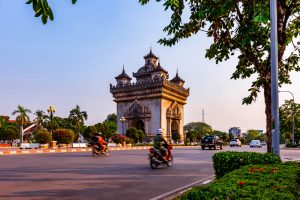A survey that interviews just 159 or 160 compatriots is probably not the ideal way of judging how an entire country thinks, but so few opinion polls emanate from Laos and so few international pollsters are interested in it that the latest State of Southeast Asia survey, from Singapore’s ISEAS-Yusof Ishak Institute, is arguably the best guide we have to understand how Laotians think about foreign policy. The takeaway: neutrality reigns, and Laotians are far removed from how other Southeast Asians regard some of the world’s biggest challenges.
When asked how the Association of Southeast Asian Nations (ASEAN) should move forward on Myanmar, for instance, exactly a quarter of the Laotian respondents said it shouldn’t interfere, a much higher percentage than any other nationality and double the regional average. Laotians were second only to Bruneians in expressing neutrality about ASEAN’s woeful Five-Point Consensus, which ought to be interpreted as two-fifths of Laotians not having an opinion on this matter.
Some 23 percent of Laotian respondents thought hostilities in the Taiwan Strait would not affect Southeast Asia; the regional average who thought this was 6 percent. Laotians were also the most desirous of ASEAN neutrality if conflict did break out over Taiwan. Some 22.5 percent thought that the Israel-Hamas conflict has no impact on Southeast Asia – again, the highest nationality who said this – and 43 percent admitted to not having a view on this conflict, far higher than the second-least interested group, the Burmese. Some 18.1 percent of Laotians favored no international interference in the Middle Eastern conflict, around four times the regional average.
This probably reflects the cohort of interviewees, but the Laotians are also the most flighty when it comes to their geopolitical leanings. In the 2023 interaction of this survey, 41.1 percent of respondents from Laos said that they would pick China over the United States if forced to take sides. In this year’s version, it is 70 percent pro-China. Last year, only a fifth of Laotians thought China had the most economic power in the region. This year, it was 77 percent. Last year, just 30.8 percent thought China had the most political influence in the region. Now it’s 64 percent.
In this year’s survey, Laotian respondents are the most positive about China, which makes some sense given how integral China is to the country’s development and just how concerned these respondents are about their own country’s economic woes. Some 45 percent of respondents from Laos thought China was the leading champion of global free trade. Malaysians were the second-most positive of China in this regard, with 27.6 percent of them seeing Beijing as the main free-trade champion. Bizarrely, around 36 percent of Laotians reckon China is the leading champion of international law, three times the regional average.
Laos is arguably Southeast Asia’s most hermetic state. In trade, it really only has dealings with its immediate neighbors. In diplomacy, that is slowly changing, and its ASEAN chairmanship this year has brought it into much closer contact with European, American, and Australian counterparts. This month, the foreign affairs minister, Saleumxay Kommasith, called on his staff to push economic diplomacy.
Vientiane likes the cliche of being land-linked, not land-locked, yet the ISEAS-Yusof Ishak Institute’s survey results suggest that land-locked thinking still seems to persist. Laotians were second-highest, after Vietnamese, at thinking that the Russia-Ukraine war is a top-three geopolitical concern for the region, but whereas 13 percent of Vietnamese said this was because the conflict eroded trust in the world order, just 2.5 percent of Laotians were worried about the war’s international impact. Instead, 86.3 percent of respondents from Laos, a figure far higher than the regional average, said the primary impact of the Russia-Ukraine war was that it has led to increases in energy and food prices, causing economic hardship. Again, this makes sense since Laos has arguably been the country in the region hit the hardest by the war’s impact on food and petroleum prices. But responses to this issue, as well as many others covered in the survey, show that Laotians have little concern about the international impacts of international events.
Of course, you can say that I’m cherry-picking. And, of course, you could point to some responses in this study where Laotians answered in similar ways to the rest of the region. But just as a quotation is always a comment out of context, the findings of a 76-page opinion survey have to be selectively interpreted. One cannot aggregate 51 questions over a vast array of issues. The point I’m trying to make is that with some regularity, the Laotians polled in this survey thought very differently than their Southeast Asian comrades on some of the most important topics of the day, contrived not to have an opinion – Laotians battled it out with Bruneians in this survey to say “no comment” to many of the questions, which one can interpret, perhaps not too unkindly, as an expression of not caring about the issues – or were mostly motivated by pure economic self-interest.
When asked to name the top three challenges facing Southeast Asia, Laotians were well above the regional average in answering: intensifying economic tensions between major powers (they were the most concerned of the nationalities about this); unemployment and economic recession; and widening socioeconomic gaps and rising income inequality.

































